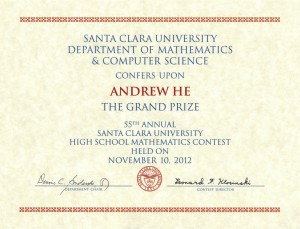“I was surprised, but it wasn’t unexpected.”

That is how sophomore Andrew He summed up his reaction to winning the grand prize at the annual Santa Clara University High School Mathematics Competition.
The annual competition, which first started in 1958 by Santa Clara University’s Department of Mathematics and Computer Science, took place on Nov. 10, and the results were announced on Jan. 25, in the daily bulletin. According to the contest’s official website, the competition “is a three hour exam which tests problems solving skills and mathematical ingenuity rather than being directed towards the contents of a specific course.”
In other words, problem three on the 2012 exam, for example, asked students to order the numbers 2^600, 3^500, 4^400, 5^300 and 6^200 from smallest to largest—without using a calculator .
He’s success in the contest, and perhaps the reason for his nonchalant reaction towards the results, is due to the fact that he is already a veteran contestant for other harder competitions.
“In general, I do preparations for various other competitions that are, you know, harder than [the Santa Clara competition] ,” said He. “Those are the kind of things that I tend to spend my time studying for.”
Ever since his first math competition which took place in Hong Kong when he was a sixth grader, He has competed in a long list of math competitions, including a national Math Count Competition in eighth grade, the American Math Competition (AMC), the American Invitational Mathematics Examination (AIME), the USA Junior Math Olympiad, the Stanford Math tournament, the Caltech Harvey Mudd Math Competition and the Harvard MIT Math Tournament. Although He says that he hasn’t won any other contests, he says that, with exception to the AIME, he placed within the top 20 in all the ones he participated in the past two to three years.
According to He, he participates in contests not because of pressure or encouragement from parents and teachers, but rather because of his own intrinsic enjoyment in mathematics.
“Why you like something is very vague,” He said. “It’s just fun.”
Evidently, this view is not uncommon among contestants, whose method of approaching competitions sometimes follows a similar pattern to He’s. For example, freshman Grace Li, who received an honorable mention in the SCU High School math competition, said that she had participated in the Gifted and Talented Education (GATE) Math program, a program in elementary school for students to study an accelerated math curriculum. In addition, she competed in the elementary school Math Olympiad and in Math Counts in middle school. According to Li, although her parents encourage her to participate in contests, they don’t pressure her to succeed.
“Most of the pressure is from myself,” said Li.
When asked how much pressure she puts on herself on a scale of one to ten, she replied with an eight.
But while Li is excited about her score, noting that she was competing with plenty of contestants who excel at math, He received his grand prize with a different reaction.
“It’s not as exciting as one would imagine,” He explains.
As for plans for college and a career, He reckons that he’ll be involved in either math, computer science or physics, but doesn’t have any definite plans for which college to go to or which career. Despite the plethora of accelerated math contests, he is still a sophomore in high school with a typical indecision about the future—which is just another mystery for him to solve.








